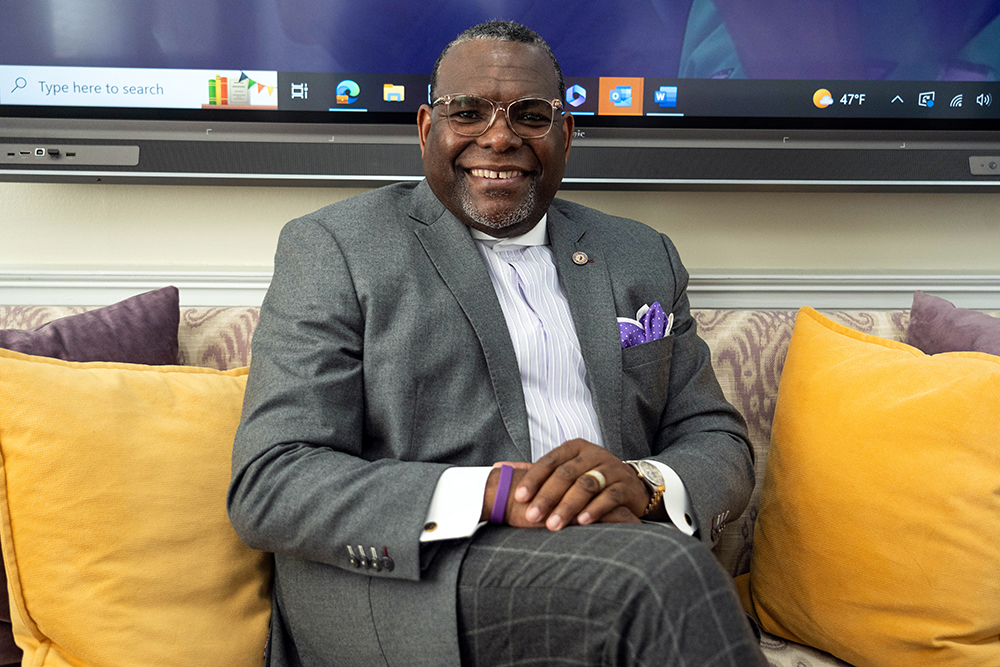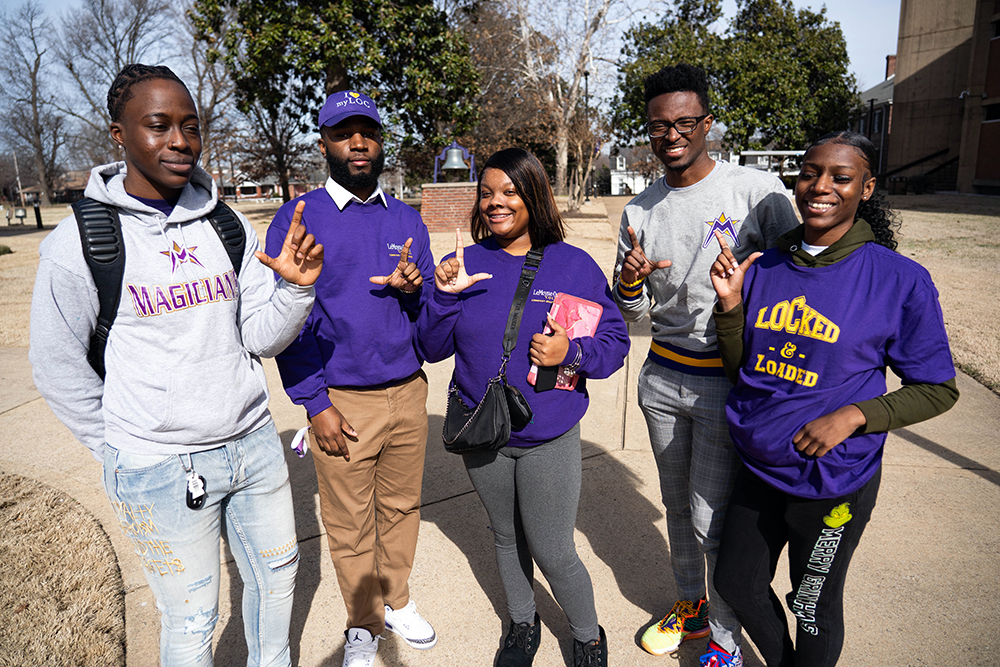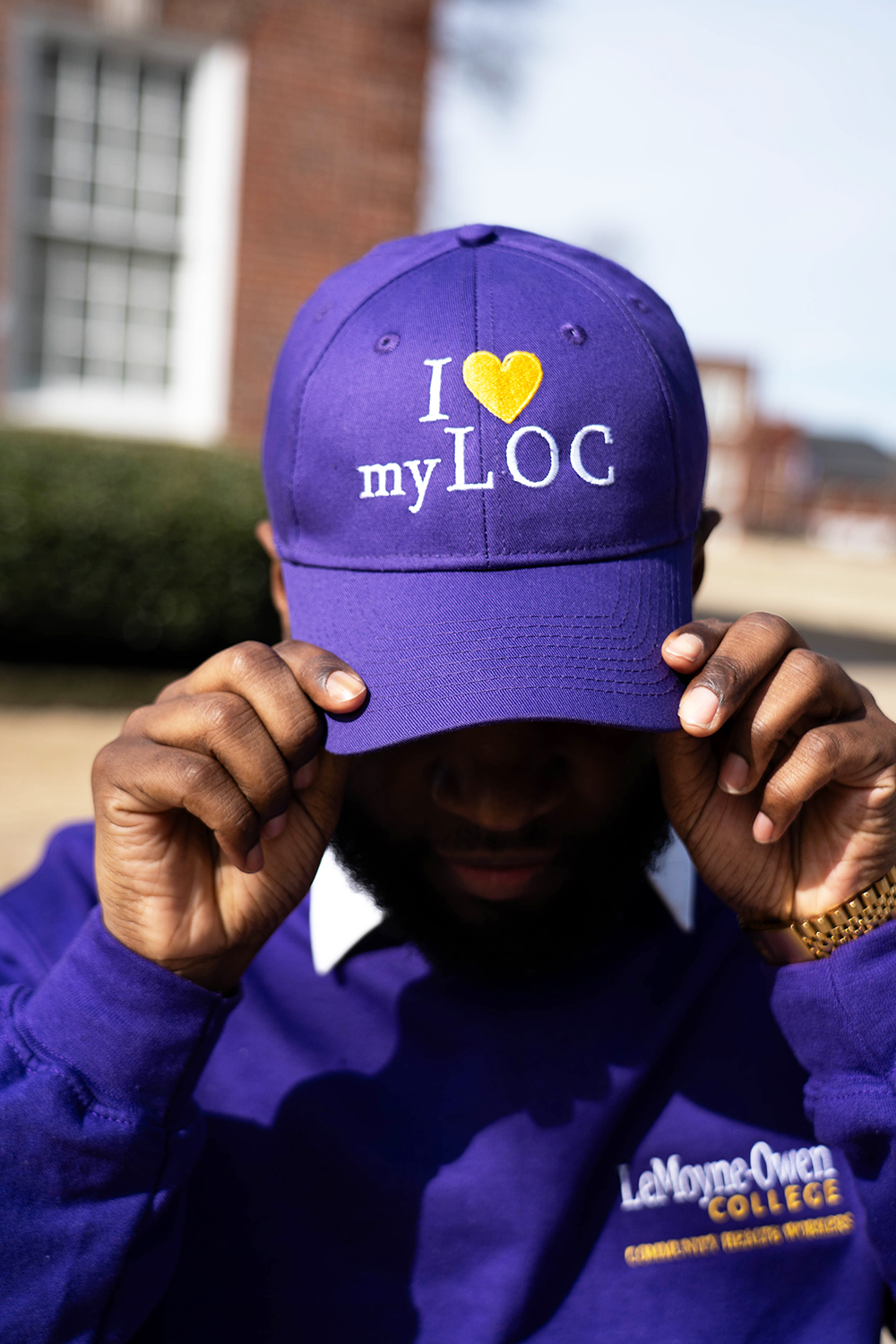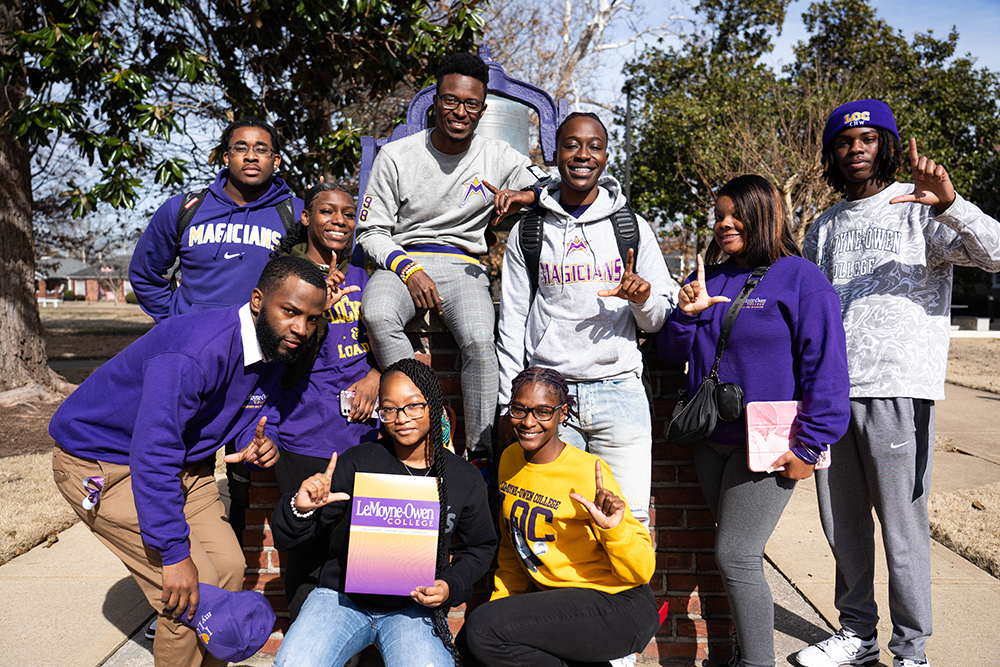LeMoyne-Owen College (LOC) is “The Source” of all things. The source of Black culture, pride, excellence, and, of course — magic.
This is the newest tagline for the school now in the midst of a brand change that claims its own narrative and marks its own way forward. The new effort is led by interim president Christopher Davis, inspired by new heights he believes the school can reach. The school has already been a source, having given so much to Black thought, civil rights, and political action. Davis thinks LOC — as The Source — has a lot more to give from a wealth of untapped potential.
Davis’ involvement with LOC goes beyond his tenure as interim president, dating back to 1999 when he served as senior pastor of St. Paul Baptist Church, which has been a “longtime financial supporter” of LOC. He has served in a number of representative capacities for the school and was appointed interim president in 2023, following the resignation of then-president Vernell Bennett-Fairs.

At its core, the school has been a source of educational enrichment, fulfillment, and opportunity — staying true to its original vision. But, Davis says, the school gets lost in larger conversations about historically Black colleges and universities (HBCUs) as a whole. “Our new tagline is this idea of being ‘The Source,’” Davis says. “As I looked at that, I really began to think about what that means given the fact that we’re the fifth oldest HBCU in the nation.”
The college is the only HBCU in Memphis, with its history dating back to 1862 when Lucinda Humphrey opened an elementary school, which became known as Lincoln Chapel, at Tennessee’s Camp Shiloh for “freedmen and runaway slaves” during the Civil War. The school was destroyed in 1866 due to fire in race riots three years after being relocated to Memphis.
“The school was rebuilt and reopened in 1867 with 150 students and six teachers,” say school officials. “In 1914, the school was moved to its present site on Walker Avenue, and the first building, Steele Hall, was erected on the new LeMoyne campus. LeMoyne became a junior college in 1924 and a four-year college in 1930.”
Owen College, founded in 1947 after the Tennessee Baptist Missionary Educational Convention, built a junior college on Vance Avenue. It opened its doors officially in 1954, and was then known as S.A. Owen Junior College. Students at Owen College became known for their tenacity and involvement in the Civil Rights Movement, including sit-ins in 1960 to desegregate city facilities. But the school began to face a number of financial challenges and losses, and entered a merger with LeMoyne college in 1968.
With such historical richness of the school, Davis began to wonder, “How is it that we don’t have the same public profile as some of the other HBCUs that you hear about all the time?” He explains that when more prominent HBCUs such as Morehouse, Spelman, and Hampton “were still a hope in somebody’s heart,” LeMoyne-Owen’s doors were already open — and the school had been reactive as opposed to proactive in terms of “shaking the narrative.”
“We’re going to take control of the narrative,” Davis says. “No longer are we going to react to what people say about LeMoyne-Owen, but we’re going to introduce them to [the] LeMoyne-Owen that we know, love, and support.”
Memphis Mayor Paul Young serves on the LOC board of trustees. He says the college impacts not only the city, but HBCU culture in general. “The importance of our only HBCU in the country’s largest minority-majority city cannot be overlooked,” Young says. “The institution offers a supportive community that fosters meaningful real-world connections and success. So many successful Memphians graduated from LOC, including my dad. It is a pillar in our city, and I believe it will be a catalyst for growth in the South Memphis community for years to come.”

Stick and Stay
The school that so many revere has withstood a number of challenges, a testament to the persistence and doggedness ingrained in its foundation. Countless students have entered LOC’s doors and left as proud Magicians.
Everyone plays a role in shaping LeMoyne’s reputation, Davis explains. Both past and current students. “If you’re concerned about the long-term trajectory of Memphis, how do you invest in any place other than LeMoyne-Owen since we’ve demonstrated that our students stick and stay?”
Alumni play a pivotal role in the lasting impact of the school. LOC “can’t make it without their alumni,” Davis says. “We need more than just their check. We need their presence on campus. I need them walking around saying to students, ‘I was where you were, and this is what LeMoyne-Owen was able to do for me.’”
June Chinn-Jointer is a 1979 graduate of LeMoyne-Owen who’s known lovingly around campus and in the LOC community as a devoted alumna.
“[I was] a regular college student, had all the fun that any other college student would have,” Chinn-Jointer says. “You talk about having fun? I had a ball — I really did.”
Chinn-Jointer majored in social work and originally worked in the field after graduating, but a return to higher education kept beckoning. In October of 1980, she was hired as an alumni senior counselor in the career service center at LeMoyne-Owen, where she helped graduating seniors prepare to enter the job force. After displaying a vested interest in the lives of students, Chinn-Jointer was urged by mentors and school officials to move toward recruitment.
“That’s how I got into higher ed, and I’ve basically been here ever since,” she says. “I’ve had some good times here. I’ve worked at other higher-ed institutions, but I would always come back home. They would call and ask me to come back and I always came back — happily — to help my students at LeMoyne-Owen College.”
Chinn-Jointer has “worn many hats” at LOC. She has previously served as the dean of enrollment, dean of retention, and more. She currently serves as the director of alumni affairs, and as she talks about her time at the school, both as a student and in her career, it’s clear that she’s moved not only by her love for her alma mater but for the students as well.
She recalls how her own experience as a student was made better by previous alumni and mentors. As she lists the names of some who helped her along the way, she notes that their dedication wasn’t solely based on encouraging academic achievement. “Not only were they dads and moms, they kept us in line. They knew we were going to be traditional college students — playing cards, partying, and all that kind of good stuff — but they also made sure we stayed focused while we were here.”
A genuine interest in student retention and success is something that keeps many Magicians returning to the school long after they graduate, Chinn-Jointer explains. But she also speaks of a magic essence — one that is made stronger by the students who bring the campus to life, both on and off the school’s grounds.
Take, for example, the involvement of LOC students in the Civil Rights Movement. Their passionate engagement resounded through later generations of students as the need for more marches and activism opportunities grew. Chinn-Jointer explains it is a demonstration of the university’s lasting commitment to “dignity and respect.”
“Your experience as a student here is a lasting, fulfilling relationship that you have. You don’t ever lose it,” Chinn-Jointer says. “We always talk about the magic and the LeMoyne-Owen mystique — it’s wearing those LeMoyne-Owen colors, the purple and the gold, very proudly. Holding your head up, shoulders back when you walk into a room with anybody — you can stand toe-to-toe with them. That’s being a LeMoyne-Owen graduate.”

There’s No Place Like LeMoyne
As president, Davis emphasizes the impact of alumni in helping the school reach new heights, but he also calls on current students to help tell LOC’s story. A crucial part of this, he says, is stressing that their decision to enroll there is one of intention. “You didn’t come to LeMoyne because you couldn’t go somewhere else. You came to LeMoyne because you were convinced there was no place better. We want to give them the tools and resources to, number one, live into their authentic selves, but most importantly, be positioned to be successful in life.”
For Danielle Jathan, attending LOC has been the coming-true of a seemingly unattainable dream. Jathan made LOC a home away from home as an international student hailing from an inner-city community in Jamaica called Waterhouse. “[In Waterhouse] there’s a lot of crime and violence, teenage pregnancy, gun violence — I actually never thought I would come out of that,” says Jathan. “The system makes it so hard to rise above it from a lower class.”
The idea of rising above wasn’t germane to her situation at home though. Jathan is the 2023-2024 Student Government Association (SGA) president, a peer tutor mentor, and a member of Collegiate 100 and the Rotary club, to name a few.
Jathan was also chosen to represent LOC at the White House as a 2023 White House Initiative HBCU scholar. There, she says, very few had heard of the college, so she embraced the opportunity to speak “more and more” about LeMoyne-Owen.
“It was nice for me to actually get the school’s name out there,” Jathan says. “We have this saying in Jamaica [that fits], ‘Wi likkle but wi tallawah,’ meaning people think we’re this small, private school and we don’t have much talent, but really we’re so rich with talent and prosperity.”
While Jathan plays a prominent role on campus, leadership is relatively new to her. Back at home she was known to lead from behind, she says, staying to herself and letting others take the reins. But this all changed when she came to LOC, where opportunities to lead appeared at every turn. “People kept calling me to things, saying, ‘Danielle can do this. Danielle can do that,’” says Jathan. “I realized students looked to me, and I realized I was actually good with [building] relationships with them.”
Jathan’s work is demonstrative not only of the Magician spirit, but of her devotion to motivate her fellow students to succeed. While Jathan’s involvement is marked by encouraging others, she is also able to pinpoint the ways that LOC has poured into her.
“[LOC] has equipped me with all of the leadership skills I need,” she says. “It actually brought out the leadership qualities that I already had that I didn’t know I had.”
This is a crucial element, especially for students who venture from their hometowns to study at LOC. Honesty Campbell and Kevin Bland are two out-of-state students, studying business management and special education, respectively, who both agree that the essence and life of the campus made their decision to enroll easy.
“From the moment I stepped on the campus, I felt a vibe,” Bland says. “It was a little different. Everyone seemed to operate on family time. I didn’t want to go to U of M — thought it was too big. I decided to sit down somewhere where the environment is small and where I get to learn everybody that I can.”
The more intimate setting of 463 students invokes a tight-knit bond that students adore. Campbell didn’t visit the college prior to enrolling, but through relationship-building with her peers she now knows she made the right decision.
“We are surrounded and based off family,” says Campbell. “This becomes your family.”
Community impacts every aspect of the student experience, Bland says. It’s as if the school is tailored to match the needs of each student individually, as he’s found he’s never quite alone through anything he’s faced.
“There’s someone always around who’s attended the school, that knows about the school,” Bland says. “When you meet that person for the first time, there’s already a connection there.”

Magic at Work
A bulk of the magic of LeMoyne comes from alumni and current students keeping the legacy alive, but Davis says in order to continue this momentum, they have to give back to the community that helped them to become who they are today.
“One of the things I like to boast and brag about is that, regardless of where our students come from, 98 percent of our graduates stick and stay in Memphis when they graduate,” Davis says. “We have a direct impact on the economy, culture, and direction of this city.”
The school’s curriculum is constantly evolving to adapt to not only the needs of the workforce, but the city’s workforce specifically, Davis says, adding that the major markets in Memphis are education, healthcare, supply-chain logistics, and IT — and the school is responsible for supplying the needs of these markets.
For example, the school has a new partnership with MSCS as a pipeline for teachers. “We’re looking to be ‘The Source’ of teachers for Memphis-Shelby County Schools,” says Davis. “Not just any teachers, but teachers who have been trained and developed and nurtured to serve in urban school districts — specifically Memphis-Shelby County Schools.”
It’s important for students to not only stay in Memphis, but for them to be employed in the city as well. Davis hopes employers consider LOC graduates when vetting candidates for various jobs in the city, as the school has had the needs of Memphis in mind when preparing students.
“Not only do we want our students to stay here — we are training and upscaling our students so they can be employed here,” he says.
As the school continues to explore the source of what makes the school unique, it can’t be narrowed down to just one thing. The magic lives in its campus, its students, its alumni, and the legacy that has permeated the city of Memphis and beyond.
